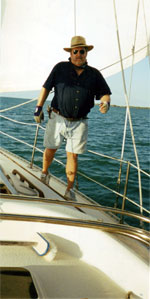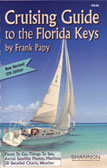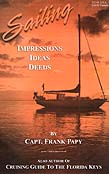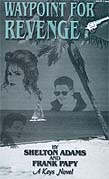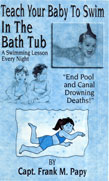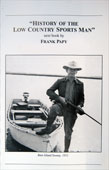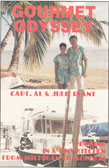Excerpt from "Waypoint for Revenge"
by Capt. Frank Papy and Shelton Adams
My neighbor in the next slip at the marina yells over, "Hey Frank, did you hear we got a new lady dockmaster, or dockmistress you would call?'
I have been here in this slip now for three years and we have had three dockmasters. But, I do love my semi-retirement. The only thing I have to do every time we get a new dockmaster is explain that the Dr. behind my name is for psychology so that they don't bring everyone around that has a splinter, sprained ankle, or upset stomach. I spent my whole adult life trying to break out of my urban anonymity. But, that Dr. behind your name is a strange thing. There is nothing behind my name that signifies all the experiences that I had on my tour in Nam. Of all the things that I know how to do , it;s the Dr. behind my name that gets the attention. It's the word that gets overheard standing around at a cocktail party when you get introduced. You see the heads turn slightly and the ears perk up from almost a click away in your peripheral vision. It's credibility, not image, I guess.
What a strange world we live in. the pain of misfortune has been one of the greates teachers of all. As for the greatest influence for the good of the human race, it's the sting of adversity. Some of my friends have missed it all. Those who have been spared by chance or inheritance have contributed little to bless the human race, and less to their own happiness and contentment. But, I'll settle to sit out ont he back deck when the sun's going down and have a ruma nd coke. To quote one of my first patients from a rural area upon asking about religion, "Why hell Dr. Frank, I sure ain't no spiritual pygmy. Why, nature is my cathedral."
So I took one last quick glance around, went back inside, and turned up the volume of "Hang on John," a nautical sea chanty. Gordon Bok will keep you going if you believe music soothes the savage beast.
Tonight I have been invited out to supper with my last ex-wife. She always says, "Frank, you've had two perfect marriages. They just didn't last very long."
The grilled dolphin and the cocktails were delicious. Laura left the boat about one. In my tired satisfaction, I heard the phone ring. My alarm clock read 3 a.m.
"Frank, I have to see you. I have to talk to you." There was urgency in Robert's voice, which I had not heard in five years of friendship, over a thousand hours of conversation.
"Robert, you know the rules. We'll speak in the morning. I can see you early." Reminding a friend of the rules of conduct is unpleasant but often a necessary aspect of what I do.
"To hell with the rules, Frank. I need to see you. I need to see you now. Jesus, don't you think if it could wait until morning, I would call you then? I must see you now."
"In the morning, Robert. Whatever it is, it will wait until morning. I'll meet you at Ronnie's at eight." I cautiously hid my irritiation at being wakened from such a rare and peaceful sleep. But I had to be firm. Rules must be followed. Rules gave structure to the chaos of life.
"Frank, please." Robert was pleading. Begging. Even if I wanted to submit (which I didn't) I had to remain firm. Robert continued, his voice was a strange mix of weakness and determination. "I'll come right over. I can be there in ten minutes."
"You can't come now, Robert. You know that. Why insist on violating tested procedures?" I tried to explain to him this was not an arbitrary decision, but a part of a process he should have confidence in.
"I don't have the TIME dammit. Can't you hear me? I am in trouble, Frank. Big trouble. What do I have to do to convince you? I need to see you now."
I said nothing, letting the poignancy of a protracted pause work on his mind, hoping it would calm him down.
"You're not going to see me, are you?" Robert's anxiety, his fear, had turned to resolution. That process is important to what I do. "All right," he sighed. "Eight o'clock, but not at Ronnie's. I'll meet you at the Dock House on the corner of Eighth and Ventura."
"That's a little seedy of a neighborhood, isn't it Robert?" It was a rough section of town; not the type of place Robert would frequent. But, I knew not to argue. I had won the important point; Robert was going to follow the rules.
We hung up, but the sleep I had enjoyed was gone. It never returns after three in the morning. I knew I had the rest of the night to think about Robert Peterson.
When we met, Robert was on a very large roll. As a real estate developer, he had turned a very small business into one that made millions. He was a genius at what he did. he was also a different type of person than most business people I knew. He lacked the consuming competitiveness most successful entrepreneurs have. He had an essence, an awareness that could not reconcile with the commercial world he lived in. That quality attacted me, and in the five years of our association, I had come to know him well. I liked him.
The early morning call was unlike Robert. He rarely panicked. He was the calmest of my friends. Our conversations about problems were mostly philosophical. Robert struggled for congruity and perspective, an unusual trait. As I reconsidered the urgent sound of his voice, I began to doubt my decision to force him to follow our rules.
Since sleep now seemed impossible, I fixed myself a drink and sat down at my desk. I accessed my office computer and called up my notes on our last meeting. I always make notes, even though I rarely forget a conversation.
I had not seen Robert in six weeks. Our last meeting was on my boat on a clear spring day. As green letters filled my computer's screen, I let my mind recreate the scene.
The first notes said, "Seems troubled about business reserves." It reminded me of how desperate he sounded on the phone. I had taken down a quote of his on the computer record.
"What do you do, Frank, when everything that has woked for you before fails? How do you adjust? How do you select the new course when you abandon the old?"
Those were rhetorical questions. Robert often began his dissertations with rhetorical questions.
"You know how wrong people are about businessmen. They believe it to be a gift, something that one person is better at than another is. Americans put the successful businessman on a pedestal. They reward him with admiration and respect. They give him material possessions beyond his needs and often beyond his desires. But, they never analyze the essence of what makes him different."
"The only clue offered is idiotic and motivational books written by idiots for megalomaniacs. You'd think with all the scientific research that this country is involved in, someone would look for a common denominator."
"I mean, this country is about money, isn't it? Nothing else is important in American, not really. You'd think someone would try to isolate what makes someone succeed and someone else fail. What could be more important?"
"Why don't you do it Frank? You're a scientific guy. Why don't you discover the secret to the American psyche?"
Most of the time Robert and I just talked. But something differed from his norm with this conversation. He seemed struggle for something. "Is there a reason for your concern, Robert?" I asked, concerned about his intensity. Robert had rarely discussed business and when he did it was usually some peripheral comment to explain a possible distraction.
"Yeah," he said almost apologetically. "There's a reason. I'm going broke and I don't know why. More importantly, I don't know what or how to change. And, I don't know what it will do to me once it happens."
"Are you sure?" I asked, amazed at the revelation.
He looked at me for a long time. "I'm sure." He searched my eyes for some sort of answer.I had none. "The project I started, my biggest one, the one that's been written up in all the trade journals, is going to fail and cost me seventeen million dollars. It will wipe me out and none of it is my fault, there's nothing I could have done differently and nothing I can do to prevent it from failing."
His voice held no panic. Like someone who wonders why they get seasick. Just curious about his problem's cause and a quest from some sort of answer.
I reached for something to say. "What will you do?"
"I don't know. That's why I wanted to talk to you. I hoped you could give me the perspective it will take to face this kind of thing at this point in my life."
"There are plenty of platitudes I could offer." I knew anything I could say would sound like that to Robert. He was searching for more. He was looking for intelligent insight.
"Robert, I've known you for a long time. Of all my friends, you have the best grip on life's vagueness. But, I don't know what you will do. I would, however, place a bet on your ability to survive this or any other crisis." It was an honest statement. I was surprised by his reversal, but couldn't imagine anything keeping him down. Robert was a winner and I was convinced all he needed was a reconfirmation to get back on steady course.
He was silent, so I continued. "You remember how we used to talk about Carlos Castaneda and the warrior spirit? The spirit was the thing that prevailed. Circumstances were neither good nor bad, only a test of a warrior's ability to master them."
His face still showed no comfort. "I've been playing the warrior for a long time, Frank." he said quietly. "This is one situation I won't master." There was resolution in his voice, a sense of certaintly. I knew I had to change my tact. Obviously, he had already explored this idea.
"Can you live without it? Can you live without the trappings of success you've become accustomed to, sailing whenever you want to , etcetera?"
"It's not the things," he said. "Anybody can live without the things. It's the feeling of futility that plagues me. The feeling that after carving the piece of wood that was my life, carving it patiently and carving it carefully, carving something that worked for me, that gave me value, that gave me worth and comfort, it's all going to end up flotsam and jetsam in front of my eyes, shredded into pulp. I have been so careful to protect it and have confidence in that feeling, it's not just the business I lose, it's my confidence in my ability to bring order to my universe."
The computer reminded me of Robert's words, but I didn't need them. I could hear his quiet convincing voice as clearly as if he said them on a compact disc. The notes ended with "talk to Alice. Remind yourself to keep in touch over the next two weeks, to make sure Robert is adjusting and coping." Good ideas, but I hadn;t followed up on either. I was sure the morning would show the price Robert had paid for my neglect.
I was wrong about not sleeping. I fell asleep about four and woke up almost too late to be on time, but my compulsive timeliness (being next to godliness) had hustled me through a quick shower, and a grand prix race through Fort Lauderdale's seamier side. In my haste, I almost gave one of Lauderdale's homeless a permanent place to sleep.
The dock house at Eighth and Ventura was called Cy's. Only a guy named Cy would venture into a entrepreneurial enterprise in this dilapidated neighborhood. I wondered as I locked my Jeep if it would be waiting for my return.
Cy's Dock House was little more than a cracker box stuck on a lot amidst the tattered remains of better times. It wasn't clean enough to be a nostalgic spot, but it did remind me of family dinners we went to when I was a kid.
Robert was sitting at a booth at the far end of the diner. He was unshaven. He looked like a man who had not slept in some time. As I sat down across from him, I thought that this man did not look like the Robert Peterson I had known.
"Thanks for coming, Frank," he said roughly. "I hope I didn't put you out."
"We're a little hostile, aren't we Robert? The agressive response served to cut through his resentment about postponing our meeting. "I'll make a deal with you," I said. "I won't bitch about you ruining one of my few night's sleep if you won't bitch about me insisting that we follow the rules. Rules exist for our mutual benefit"
"OK, OK," he said, "I just thought a perceptive guy like you would sense urgency a little more clearly than you did. I overestimated you, but never mind."
I had never seen this side of Robert before. In the past, he had always been so controlled, so reasonable. His voice now had an anxiousness that suggested something was very different in his life. "I need you to contact Alice," he continued.
Alice was his wife, and his request implied a marital squabble, quickly annoying me that this whole issue had been as simple as a lover's quarrel.
"Why don't you call her yourself? Are you two having a problem?"
"I'm having a problem, Frank. A big problem. I can't call Alice because the cops might be tapping her phone," he was whispering now. His comments about the police stunned me. Robert Peterson was one of the last people in the world I would have thought would have problems with the law.
"Why are the cops after you, Robert?" I asked, my voice a little louder than normal.
He grabbed my arm across the table. "Not so damn loud, mate!"
I pulled my arm away. "Why are the police after you?" This time in a lower voice.
"I killed a man, Frank. I killed my partner. I killed George Benson and the police know I did it."
"Cruising Guide to the Florida Keys"
How to Order
Available on Kindle via Amazon $9.95
108 Fox Island Road
Bluffton, SC 29910
843-987-9150
November to July 15th
88005 Overseas Hwy. #10-201
Islamorada, FL 33036
305-852-2326
